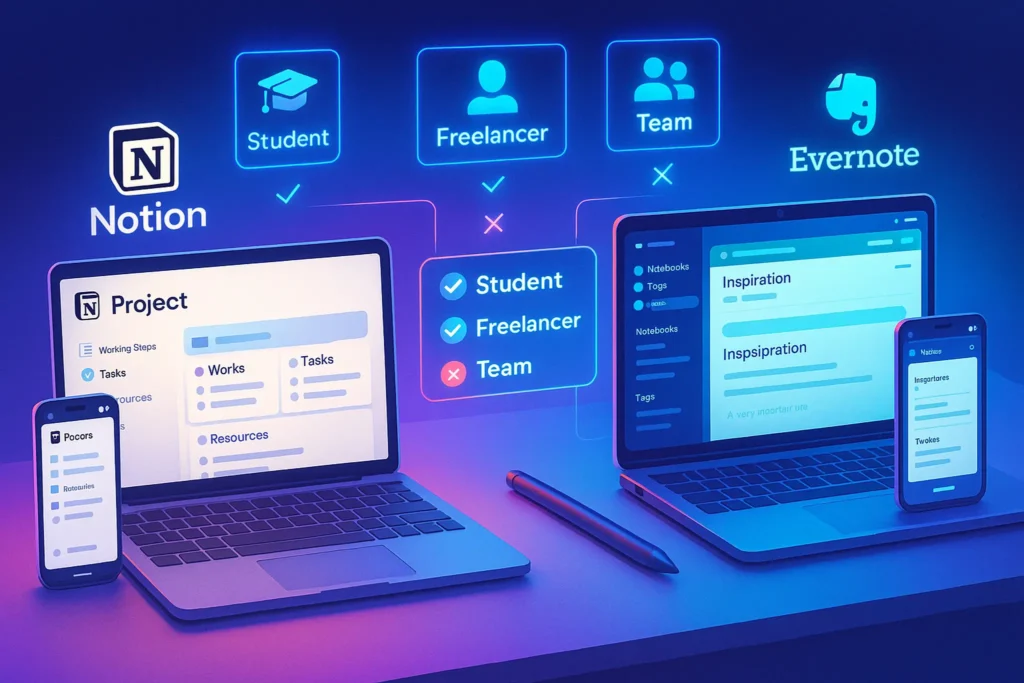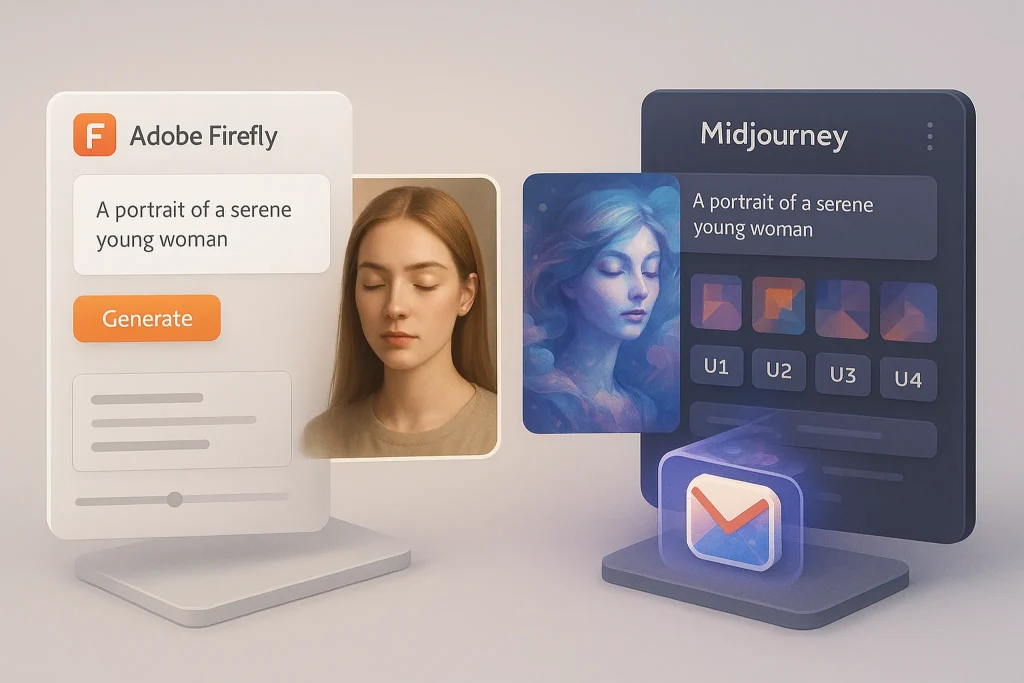-This post may contain affiliate links. If you click on one and make a purchase, I may earn a small commission at no extra cost to you.-
Introduction: The Note-Taking Battle Isn’t Over Yet
Notion or Evernote?
It’s a debate that’s lasted for years—and in 2025, it’s still surprisingly relevant.
Notion has become the darling of creators, students, and teams who love flexible, visual tools. But Evernote still holds its ground, especially for users who value simplicity, OCR, and fast capture.
So, which one is better today? Whether you’re a student juggling lectures, a freelance writer managing content drafts, or a small team looking to build a digital HQ—we break down everything that matters.
📦 Setup & Onboarding: Which One Gets You Started Faster?
Let’s start with first impressions.
Evernote:
-
Simple sign-up (email or Google)
-
Installs quickly across devices
-
UI feels familiar—like a classic note app
-
First note takes < 1 minute to create
Notion:
-
Setup feels modern, but more steps (workspace creation, tutorial popups)
-
UI is elegant, but can overwhelm newbies
-
First page creation may require reading guides
Nerd Verdict: If speed matters, Evernote is still ahead for “just start typing.” But if you’re building a system, Notion is worth the ramp-up.
📊 Onboarding Experience Scorecard
| Category | Evernote | Notion |
|---|---|---|
| Setup Speed | ✅ Very Fast | ❌ Slightly Slower |
| Ease of First Use | ✅ Intuitive | ⚠️ Learning curve |
| UI Cleanliness | ⚠️ Outdated Look | ✅ Sleek & Modular |
| First-Time Experience | 8.5 / 10 | 7 / 10 |
✍️ Core Features Comparison: How Do They Handle Notes?
✏️ Writing Notes
-
Evernote: Classic WYSIWYG editor, fast typing, rich text formatting
-
Notion: Block-based editing—powerful, but takes getting used to
🗂️ Organization
-
Notion: Nested pages, infinite depth, relations between pages
-
Evernote: Tags + Notebooks + Shortcuts = more linear and traditional
🔍 Search
-
Evernote: Industry-leading OCR search—even within PDFs & images
-
Notion: Fast page-level search, but no OCR in free version
🔗 Internal Linking
-
Notion: Easily reference blocks, databases, pages
-
Evernote: Links between notes, but less granular
📎 Attachments
-
Both support files, audio, and media—but Notion is better at visual embeds
📊 Feature-by-Feature Table
| Feature | Evernote | Notion |
|---|---|---|
| Rich Text Editing | ✅ | ✅ (block-based) |
| OCR Search | ✅ (even free tier) | ❌ (Pro only, partial) |
| Nested Organization | ❌ (limited) | ✅ (unlimited nesting) |
| Internal Linking | ⚠️ Basic | ✅ Powerful |
| File Attachments | ✅ | ✅ (with visual previews) |
For fast capture, Evernote wins. For structured knowledge management? Notion is unmatched.
🧠 Knowledge Management: Second Brain or Sticky Notes?
When it comes to organizing and retaining information long-term, the gap between Notion and Evernote becomes clearer.
Notion offers a block-based structure that turns each piece of content into a flexible “unit.” You can embed databases, link pages together, create templates, and nest entire knowledge systems. This makes it ideal for building your own Second Brain or a custom project dashboard.
On the other hand, Evernote sticks to the familiar folder/tag combo. It’s fast, intuitive, and requires no learning curve—but it’s not as scalable when your note library grows into hundreds or thousands.
If you’re looking to build a digital brain or manage complex systems like a content calendar or CRM, our guide to building a Second Brain explains why Notion is better suited for that.
Use-Case Breakdown:
| Persona | Better Tool | Why |
|---|---|---|
| 🧑🎓 Student | Notion | Visual templates + course database |
| 👨💼 Project Manager | Notion | Kanban boards, timelines, databases |
| ✍️ Writer | Evernote | Quick capture, clean interface |
| 📚 Researcher | Evernote | Strong OCR + tag-based sorting |
⚙️ Automation & Integration: Smart or Manual?
Evernote has solid integrations with:
-
Gmail
-
Google Calendar
-
Outlook
-
Slack
-
Zapier
But the logic is linear: you set up a rule, and it does the job. It’s best for reminders, saving emails, or syncing tasks.
Notion, however, goes further:
-
Native integration with Notion AI for writing, summarizing, and organizing
-
Works with Zapier, Make.com, Automate.io, IFTTT, and more
-
Deep API access for developers or power users
-
Dynamic views (tables, calendars, galleries) that update based on data logic
If you’re building systems (not just saving notes), Notion feels more like an operating system for productivity.
And if you’re using AI tools for research and writing, Notion AI can directly summarize long documents, brainstorm ideas, or autofill templates—something missing in Evernote’s simpler AI assistant.
📱 Mobile + Sync Experience: Anywhere Access?
Let’s be real: mobile sync can make or break a productivity app in 2025.
Evernote:
-
Fast loading, even with large note databases
-
Reliable offline access
-
Mobile widget support for quick capture
-
Camera scanning for handwritten notes
Notion:
-
Much improved mobile UI since 2023
-
Still slightly slower with large pages or complex databases
-
Offline mode finally works—but caching can be inconsistent
-
Rich experience for structured notes, but less “quick and dirty”
Nerd Verdict: If you’re always on the move and need instant access to notes, Evernote wins. But for working on structured docs or planning dashboards, Notion on mobile is now genuinely usable.
📊 Sync & Mobility Reliability Score
| Metric | Evernote | Notion |
|---|---|---|
| Mobile App Performance | 9/10 | 8/10 |
| Offline Access | ✅ Strong | ⚠️ Mixed |
| Sync Speed | ✅ Fast | ⚠️ Slower with large pages |
| File Upload from Mobile | ✅ Easy | ✅ Rich, but heavier UI |
💸 Price & Plans: What Do You Get for Free?
Pricing in 2025 matters more than ever—especially for solo users or small teams.
Evernote
-
Free Plan: Limited to 50 notes and 1 notebook (very restrictive)
-
Personal: $14.99/month
-
Professional: $17.99/month
-
Teams: $24.99/user/month
Notion
-
Free Plan: Unlimited pages and blocks for individuals
-
Plus: $10/user/month
-
Business: $18/user/month
-
Enterprise: Custom pricing
Notion offers way more flexibility for free users, while Evernote’s free plan has become borderline unusable in 2025.
📊 Price vs Feature Breakdown
| Tier | Evernote | Notion |
|---|---|---|
| Free Plan | ✅ Basic notes only | ✅ Full personal use |
| Entry Paid Tier | $14.99/mo | $10/mo |
| AI Features | Partial (no custom prompts) | ✅ Native Notion AI |
| File Upload Limit | 10GB/month (paid only) | No hard limit (cloud-based) |
🧪 Real-World Workflow Tests: Which One Handles Daily Tasks Better?
To truly understand how these apps perform, we ran them through real-life productivity scenarios.
✍️ Writing a Blog Post Draft
-
Notion lets you outline with toggle lists, embed research sources, and link to related projects—all on one page.
-
Evernote allows quick typing and formatting, but long documents can feel cluttered without block separation.
🧳 Planning a Trip
-
In Notion, you can create a travel database with columns for destination, budget, checklist, links, and map embeds.
-
Evernote is great for clipping booking confirmations and quick to-do lists but lacks deeper structure.
👥 Managing a 3-Person Team
-
Notion shines with shared pages, task boards, and comment threads.
-
Evernote offers shared notebooks, but lacks fine-grained permissions and project visibility.
📚 Summarizing Class Notes
-
Evernote’s OCR and scanning tools are excellent for handwritten note uploads.
-
Notion wins for active learners who want to build interactive revision tools (databases, Q&A toggles, linked flashcards).
Nerd Verdict: If your work is linear and capture-heavy, Evernote is a great fit. If you prefer building systems and customizing your flow, Notion leads the way.
🧩 Customization & Templates: Build or Use Out-of-the-Box?
Notion is all about customization.
From habit trackers to full knowledge systems, it offers:
-
A massive public template library (both official and community-made)
-
The ability to build your own templates and share them
-
Rich database views, filters, and formula support
Whether you want a content calendar, a CRM, or a Second Brain, Notion gives you total creative control.
Evernote provides simplicity:
-
A small library of built-in templates (daily journaling, project brief, meeting notes)
-
No database logic, just formatted text blocks
-
Templates can be customized slightly, but layout is mostly static
If you’re the type of user who says “just give me a place to write,” Evernote is easier. If you say “I want to design how I work,” Notion is the playground.
💡 Nerd Tip: Many students and creators use public Notion templates like Thomas Frank’s Second Brain setup—fully editable and connectable to Notion AI. You won’t find anything close to that flexibility in Evernote.
🌍 Collaboration & Team Use: Better for Solo or Squad?
When it comes to working in a team, the experience is night and day.
Notion:
-
Designed from the ground up for collaboration
-
Real-time editing with live cursor tracking
-
Commenting, @mentions, and granular sharing (view, comment, edit)
-
Teamspaces, custom roles, and workspace-wide navigation
Evernote:
-
Offers shared notebooks
-
Comments on notes exist, but less fluid
-
Limited roles and permissions
-
Can feel clunky in multi-user workflows
For small startups, content teams, and remote collaboration, Notion acts like a lightweight project management system. In contrast, Evernote remains a solo-first tool with limited team dynamics.
If you’re managing a team or building shared knowledge systems, Notion is the more scalable and modern choice.
🔐 Security & Privacy: Is Your Data Safe?
Security may not be sexy—but when it comes to storing sensitive notes, it’s essential.
🔒 Evernote
-
Offers password protection on individual notes
-
Two-factor authentication (2FA) supported
-
Data stored on Google Cloud, encrypted in transit and at rest
-
No end-to-end encryption (E2EE)
🛡️ Notion
-
No per-note password, but supports workspace-level permissions
-
2FA supported, with OAuth login options
-
Hosted on Amazon Web Services (AWS) with SOC 2 Type II compliance
-
No E2EE either, but strong infrastructure and API-level security
While neither offers E2EE, both are secure enough for most use cases. For highly sensitive data (legal, medical, etc.), users should consider local encryption options or self-hosted solutions.
Related: If privacy is a top priority, check out our post on Best AI Note-Taking Apps for Students, where we explore tools with better privacy guarantees.
🔄 Micro-Comparison Summary: Who Should Use What?
By now, you probably see a clear pattern:
✅ Choose Evernote if you…
-
Need speed and simplicity
-
Prefer a traditional note-taking feel
-
Rely on search, especially OCR in images and scans
-
Want to quickly jot down ideas or capture receipts, voice memos, PDFs
Evernote still thrives as a reliable, no-fuss tool—especially for writers, researchers, and info collectors who want everything searchable.
✅ Choose Notion if you…
-
Like to build custom workflows and dashboards
-
Want to manage projects, tasks, and docs in one space
-
Prefer visual layouts (Kanban, calendar, gallery)
-
Want AI help for organizing, summarizing, or creating content
-
You’re building a Second Brain, team wiki, or digital hub
TL;DR: Notion is more powerful, modular, and future-facing. Evernote is simpler, faster, and better for capturing info on the go.
🤖 Notion AI vs. Evernote AI: Real-World Use Test
Both tools now offer built-in AI assistants—but they’re very different in scope and intelligence.
We ran three real tasks through each:
🧪 Test 1: Summarize a 1200-word blog post draft
-
Notion AI: Generated a clear 5-bullet summary with good section labeling and tone match
-
Evernote AI: Created a basic paragraph summary, but lacked nuance or section separation
🧪 Test 2: Brainstorm blog title ideas
-
Notion AI: Produced 10 variations with different tones (formal, casual, SEO-optimized)
-
Evernote AI: Offered 3 ideas, all very generic and uninspired
🧪 Test 3: Rewrite a paragraph to sound more confident
-
Notion AI: Gave 3 rewrites in different styles (neutral, bold, empathetic)
-
Evernote AI: Offered 1 revised version with minor tone shift
Verdict: Notion AI is significantly more powerful, versatile, and useful for creators and knowledge workers.
Evernote AI is better described as a light writing assistant—useful, but limited.
💡 If you’re serious about integrating AI into your workflow—not just spellchecking—Notion gives you way more depth.
🧭 Final Decision Matrix: What’s Right for You?
| User Type | Recommended Tool | Why |
|---|---|---|
| 👨🎓 Student | Notion | Visual templates, linked notes, project databases |
| ✍️ Writer / Blogger | Evernote | Quick capture, OCR, distraction-free interface |
| 👩💻 Solo Entrepreneur | Notion | All-in-one: CRM, content plan, docs, goals in one place |
| 👥 Small Remote Team | Notion | Permissions, comments, collaboration-friendly |
| 📚 Academic Researcher | Evernote | Tag-based sorting + PDF/OCR + fast note searching |
| 👨🏫 Teacher / Educator | Notion | Lesson plan templates, embedded media, sharing control |
| 🧑🚀 Productivity Nerd | Notion | Full control, integrations, second brain system |
| 🧓 Casual Note-Taker | Evernote | Simple, fast, minimal configuration needed |
Remember: the best tool is the one you’ll actually use consistently. If you’re overwhelmed by too much flexibility, Evernote keeps it clean. If you love customizing your work systems, Notion is your canvas.
🧠 Nerd Verdict: Tested Both—Here’s the Reality
After weeks of testing both apps in real-world workflows—content planning, client notes, personal journals, reading databases—we’ve come to a clear conclusion:
Notion wins on flexibility, scalability, and depth. It’s a true second brain, especially if you’re willing to build systems.
But that comes with a learning curve and slower mobile performance.
Evernote, meanwhile, remains snappy, reliable, and laser-focused on notes. If your goal is quick capture and search, it’s still a strong contender—even if the UI feels a bit dated.
❓ FAQ: Nerds Ask, We Answer
💬 Would You Bite?
If you could only use one note-taking app for all of 2025, which would it be?
👇 Tell us below: Are you #TeamNotion or #TeamEvernote—and why?



